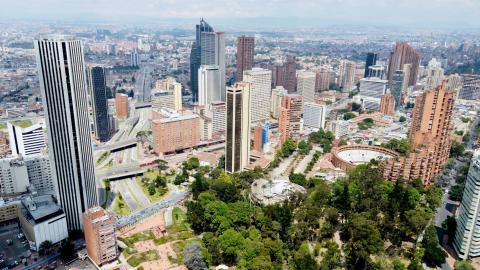
How the global pandemic has shaped resource nationalism
Adapted from a speech delivered by EITI Executive Director Mark Robinson at Investing in African Mining Indaba 2022.
Adapted from a speech delivered by EITI Executive Director Mark Robinson at Investing in African Mining Indaba 2022.
Resource nationalism is a global issue. Driven by a political motive to maximise value from a country’s natural resources, it can take many forms: increasing the government’s take, imposing windfall taxes, unilaterally changing contract terms to increase the state’s participation in the natural resource sector, or outright nationalisation.
Resource nationalism is often a response to a legitimate series of concerns – some of which led, in part, to the EITI’s inception in 2003: mismatched expectations, lack of transparency, volatile commodity prices and super-cycles that offer the promise of prosperity. These concerns are still relevant today as we emerge from the COVID-19 pandemic. Citizens want to know what resources flow to their countries and communities from extractive investments, especially in the wake of fiscal and debt crises.
From the 1960s to the 1980s, many governments focused on nationalising their extractive industries to assert greater control over the sector. The pattern looks different today, with many governments administering regulatory and tax reforms, renegotiating contract terms and introducing constitutional provisions to codify state and community shares of natural resources. While resource nationalism cannot be generalised into a global or region-specific phenomenon, it is likely to deepen with the current commodities boom.
The trends we are witnessing today in resource nationalism underscore a need for strong regional cooperation and collaboration among governments and initiatives.
The current geopolitical environment has accentuated two dimensions of this phenomenon, what one might call resource sub-nationalism and resource supra-nationalism.
Resource sub-nationalism occurs when regional and local governments in mineral-rich areas demand a greater share of value generated from extractive operations via revenue transfers. In extreme cases, this can lead to conflict.
Resource supra-nationalism arises as countries seek to secure greater access to resources that are in scarce global supply, such as critical minerals. It can create competition between powerful nation states which may be accentuated by supply chain interruptions, such as what we are seeing in the wake of the Russian aggression in Ukraine.
The trends we are witnessing today in resource nationalism underscore a need for strong regional cooperation and collaboration among governments and initiatives.
Implications for potential solutions
While the concerns that underpin these developments are legitimate, resource nationalism is rarely the right solution to address them. Nor does it achieve the objective of serving citizens’ interests, except perhaps in the very short term through windfall spending. If anything, resource nationalism exacerbates the risk of misusing public resources for private purposes rather than for the benefit of citizens.
Transparency can offer a more potent antidote by establishing clear and realistic expectations and avoiding “boom and bust” responses to commodity price cycles. Shedding light on the entire extractive sector value chain – from the point of issue of exploration through the tracking of revenues and how they are spent – is the bread and butter of the EITI. By putting revenue information in the public domain, governments and companies are better placed to demonstrate how it translates into development expenditures that benefit citizens. On a subnational level, too, transparency supports greater understanding of how revenues flow to the regional or community level.
Publishing contracts and fiscal terms in line with EITI reporting requirements helps address resource nationalism by making it easier to counter populist interpretations of unfair contractual or fiscal terms. For example, in Guyana – where there has been speculation around the terms of contracts for lucrative oil projects – the disclosure of contracts by the new government has helped to dispel distrust.
Building a culture of trust
It is possible to build a culture of trust, but only by acting in a deliberate way to establish a shared evidence base and a safe space for dialogue. Even in South Africa – where there is a strong mining industry, effective institutions and a transparent budget process – there are perceptions that the industry and government could do more to meet community expectations and publish social investments. In such a context, the EITI is one vehicle that can support a realistic appraisal of how the benefits of natural resources filter down to communities, either through resource transfers from government to communities or social investments from companies.
Gathering, verifying and publishing data and information has to be part of a collective effort to build trust.
Mismatched expectations fuel mistrust which further reduces opportunities for dialogue. Gathering, verifying and publishing data and information has to be part of a collective effort to build trust. By implementing the EITI, countries can institutionalise a collaborative and multi-stakeholder approach. In some EITI implementing countries, multi-stakeholder groups are the only forums where governments, companies and civil society meet as equals to discuss governance reforms in the extractive sector.
Related content





